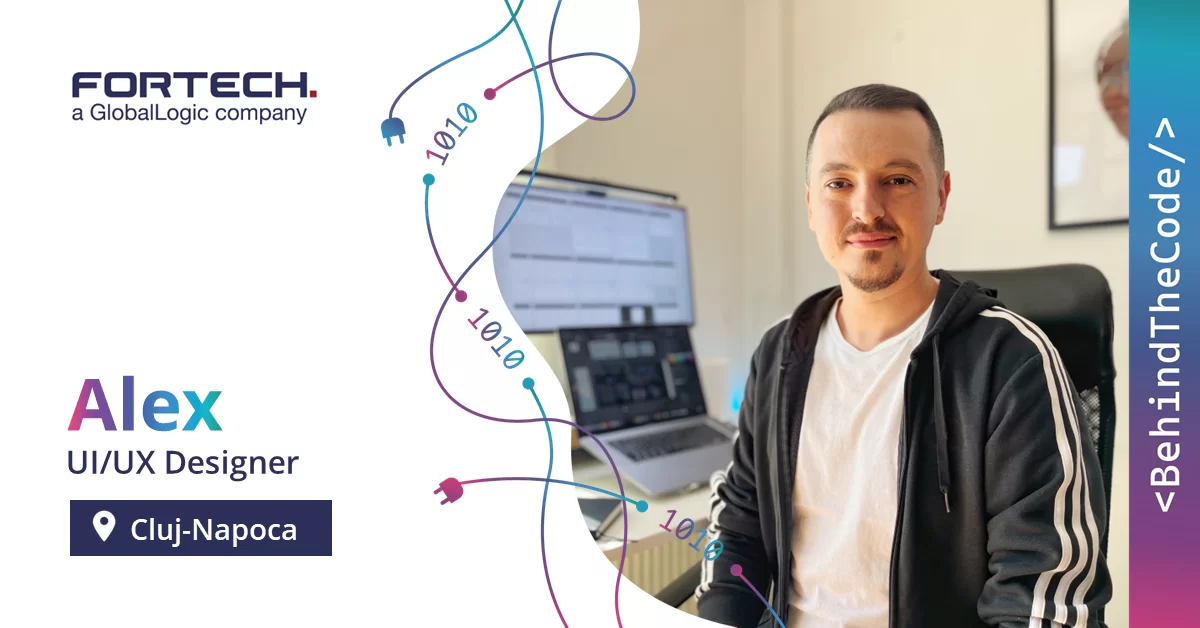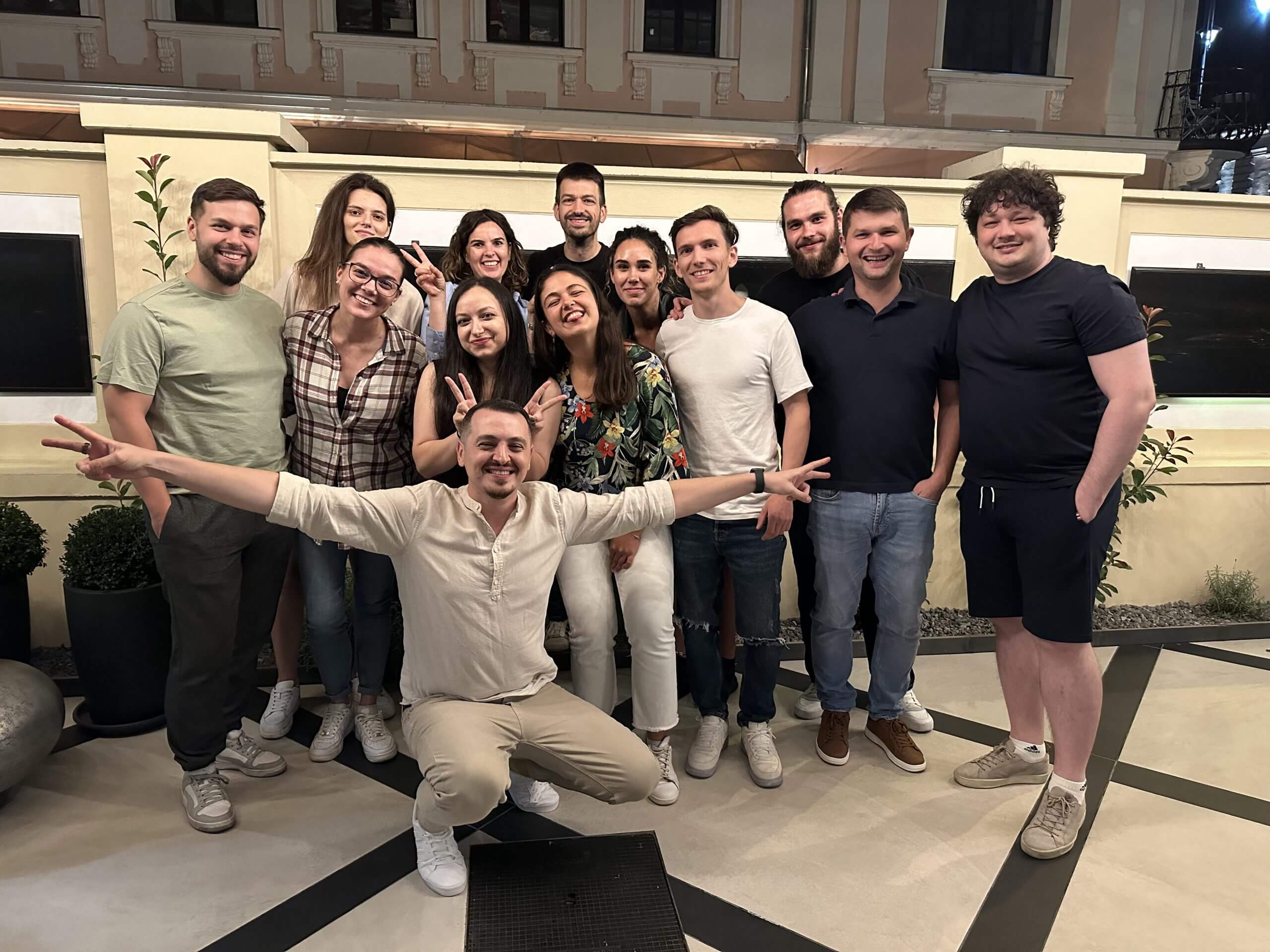Alex, UI/UX Designer, on Becoming the Mentor He Always Wanted to Have
01 November 202331 October 2023 | People
This article will delve further into our UI/UX community and give you an insightful peek into it through Alex’s story. Part of what he does is discover, create, and keep a keen eye on detail while striving to improve the overall user experience.
Get a glimpse of #BehindTheCode and meet Alex Potor, Senior UI/UX Designer and Engineering Manager at Fortech, driver of our internal UI/UX community.

Hello Alex, could you please tell us a bit about yourself?
I’m from Alba Iulia, but since 2009, I have been living in Cluj-Napoca. I started taking photography classes in high school and owned a website where I posted my work. Back then, I did not know the meaning of visual identity and had no process for defining one. Still, I knew I needed a logo, some copywriting for the content, and website customizations. That’s when I started to invest time in the Adobe Creative Suite and learn enough HTML and CSS to transform my vision into my first UI project.
Even though I was having a blast while investing time in my projects, my parents encouraged me to study medicine, so I took chemistry and biology classes to prepare for the university admission test. I was pretty good at chemistry, but I never really liked biology, so I ended up studying Communication, PR, and Advertising instead, which proved to be pretty useful for my upcoming journey.
What do you do at Fortech? Please describe your career journey at Fortech & your current role.
I started to work in Fortech as a UX designer. At first, I had a severe case of impostor syndrome for a whole month. We were just two designers on the team back then, and the industry was very different from what I know today. It took me a few months to get used to the new job, the project, and the people, but I got comfortable enough to ask to organize a UX internship and finally pursue the role of a mentor.
Looking back, I can’t help but chuckle at how I presented my request for an internship to my managers, essentially treating it like a sales pitch. I can only hope that they, too, share a smile while reading this.
Today, I have this fancy role called Engineering Manager, but in reality, I’m just taking care of a handful of designers and their career paths, creating safe spaces where they can develop new skills, exposing them to new challenges, and making sure their voices are heard.
I also pushed myself repeatedly by venturing outside my comfort zone by taking on the role of podcast host for some episodes of our internal podcast, hosting our internal recognition ceremony, Fortech Crafter Awards, and even organizing a Hackathon and mentoring two UX interns.
How did you grow into this role?
I’ll probably get a little vulnerable here, because I know that a lot of people can relate to this. I never had someone to look up to, or ask for advice, and I pretty much went for the lone wolf approach. And it’s not easy to walk this path alone, especially in an industry that relies on communication and collaboration.
I can also say that mentors often come into your life precisely when you need them rather than when you seek them out. At that point, they can actually assist you in discovering the path to unlocking your full potential. Eventually, I’ve found that person here, at Fortech. To quote her, ‘You are not a leader until you grow leaders yourself.’ I believe it works the same for mentors.
I wanted to make the job of others easier by sharing my experiences and my approaches and by offering them the guidance I believed would help them overcome any obstacles. I also encourage people to get out of their comfort zone, make mistakes, learn from them, and reassure them that I probably made the same mistake a few months ago.
My quest here is not just to be a mentor but also to mentor somebody into playing this role for someone else and pass it on to others, creating a chain of mentorship. And I’m seeing the mentor in other people as well, and I find this very encouraging. At times, I see mentoring opportunities, and I connect with people for this reason.
Mentoring people also helped me develop both professionally and on a human level because learning goes both ways. People sometimes ask me about the lessons I’ve gained from this experience. To name a few of my responses: I’ve acquired patience and the ability to listen actively, the skills of changing perspectives, establishing a supportive environment for others, and fostering a sense of gratitude. All people work differently, and there is no one-size-fits-all solution.
Tell us more about the project you’re currently working on.
Earlier this year, I joined the business team of a project in the Automotive industry. Our mission is to simplify the way our clients handle the flows and processes of their service contracts.
I think the most challenging part is to align with 4 different business streams, colleagues, stakeholders, and people from 3 different countries (and also time zones). I love seeing my wireframes open the conversations on the business and the UI and that everybody involved gets a sense of how the final product would look while navigating through the flows.
Besides the business crew, I’m also in touch with the software development teams. I’m happy to have met them in real life, and I can personally say I have favorites; just joking, they were the only ones who took a picture with me.

Alex and the M&M team in Oradea after a Product Increment Planning
What was your approach for the UX part of this project?
I am grateful to have been in the project from the beginning, and I deeply appreciate the freedom and trust our stakeholders have bestowed upon me to craft a tailored UX strategy that caters to all requirements.
While each business stream has its own specific flavor, we managed to define objectives and key results, identify user needs, run user interviews, user story mappings, heuristics analysis, and usability testing sessions while still in the design phase.
We are using atomic design as a methodology, based on the client’s design system, and we are delivering a comprehensive UX documentation and an (almost) pixel-perfect prototype.
Tell us more about the handful of designers you mentioned earlier. What is the vibe in the UI/UX community?
When talking about the UI/UX community, I always start with expressing my gratitude. I feel honored to lead this community, and I appreciate the trust they have in me and my sometimes-crazy ideas. These people are a true inspiration and watching them grow is probably the best part of my job. They are people you can rely on, very driven, who never find it unusual to walk the extra mile.
We took part in a variety of activities over the years: we ran usability testing sessions and conducted focus group interviews on our colleagues for the internal tools, we had a UX corner at the Fortech Woodstock party in 2022, and we participated in the first-ever hackathon with UX designers in each team.
We are also oddballs, and sometimes introverted, and like to have our space (especially while designing), but at the end of the day, everybody brings something to the table. As a community, we are a blend of skills and personalities with a very strong work ethic.
What advice would you give to someone interested in joining your team?
I don’t want to offer a boilerplate answer, so I will be referring to my personal experience so far. We have good mentors, and we push people into becoming mentors themselves when we see potential. And that has a significant impact on the community. And I’m not just talking about the internships, but also about our senior colleagues and their relationship with juniors.
Everybody has their own career journey, and they need to discover themselves as professionals. All I can say is that Fortech is a good starting point for this journey. It is also a good place to be challenged and unlock your full potential in any role we have to offer.
Oh, and did I mention we also have great cooks at Fortech? You should definitely come and taste something at one of our Bake Sale events.
By the way, our UX community is anxious to meet new members, so you can apply for the following roles: Senior User Experience Designer, Senior UX Designer, and Senior User Experience Designer.
What’s next in your career journey?
I am very happy to say that I am at peace with where I am right now, definitely happy to look back on all the things I have accomplished in my career, the people I have met, and the bonds and friends I have made along the way. My focus is to keep developing as a UX designer and as a leader of the UX community, seeing the team grow and taking with confidence different roles within the community.
Fortech

